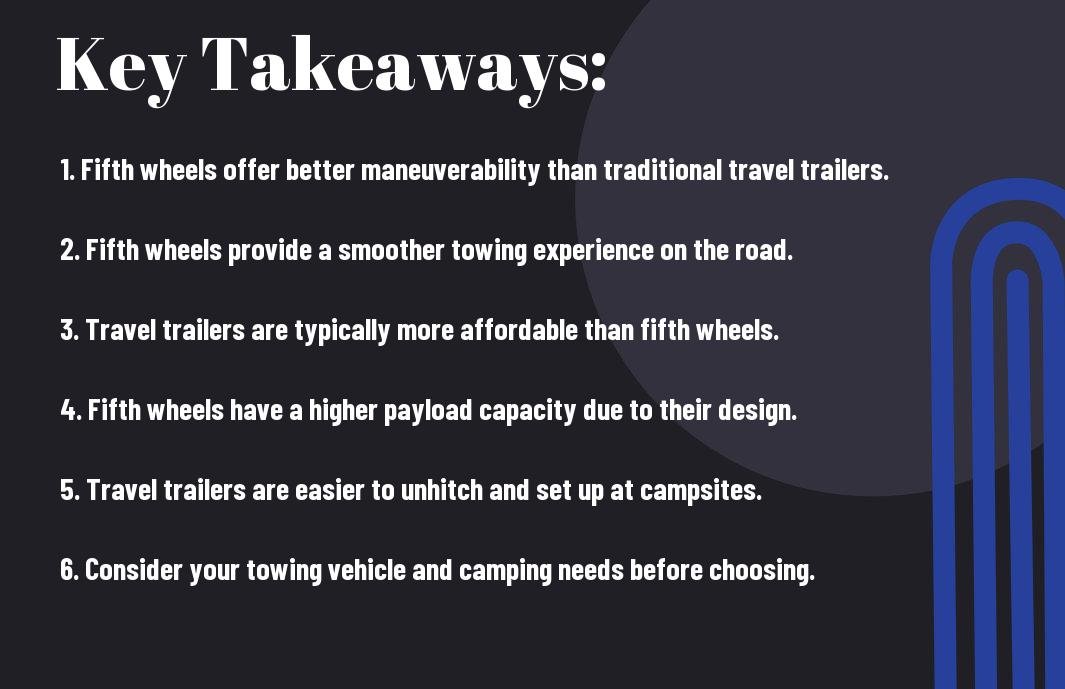Have you ever pondered over the question of whether it’s better to pull a fifth wheel or travel trailer? As an avid traveler, choosing the right towing option is crucial for your safety, comfort, and overall travel experience. Both fifth wheels and travel trailers have their advantages and disadvantages, but it’s important to consider your specific needs and preferences before making a decision. One of the main advantages of a fifth wheel is its stability and maneuverability on the road, while travel trailers offer more flexibility and affordability. However, factors such as the size of your vehicle, your towing experience, and the type of camping you prefer can greatly influence your choice. In this blog post, we will explore the key differences between these two towing options and provide you with the necessary information to make an informed decision.
Key Takeaways:
- Maneuverability: Travel trailers are typically easier to maneuver and back into tight spots compared to fifth wheels.
- Towing Stability: Fifth wheels offer better stability and control while towing, especially at high speeds and in windy conditions.
- Living Space: Fifth wheels generally provide more living space and storage compared to travel trailers.
- Cost: Travel trailers are usually less expensive to purchase and maintain compared to fifth wheels.
- Towing Vehicle: Fifth wheels require a pickup truck with a specialized hitch, while travel trailers can be towed by a wider range of vehicles with a standard hitch.
- Fuel Efficiency: Travel trailers tend to be more fuel efficient to tow than fifth wheels.
- Parking and Storage: Travel trailers are easier to park and store in compact spaces compared to fifth wheels.

Towing Mechanics
Now that you’re considering pulling a fifth wheel or a travel trailer, it’s important to understand the mechanics of towing. Towing a larger, heavier RV requires careful attention to detail and a thorough understanding of how the towing system works. In this section, we’ll cover the basics of towing mechanics to help you make an informed decision.
Hitching Systems and Requirements
When it comes to pulling a fifth wheel or a travel trailer, the hitching system you choose is crucial to the safety and stability of your rig. Fifth wheels require a special hitch that mounts in the bed of your truck, while travel trailers use a standard ball hitch. The hitching system must be properly rated for the weight of your RV, and you’ll need to ensure that your vehicle’s towing capacity meets the requirements of the RV you plan to pull. Failure to adhere to proper hitching requirements can result in unsafe towing conditions, putting you and other drivers at risk.
Stability and Handling on the Road
Once you’re on the road, the stability and handling of your tow vehicle and RV become paramount. Fifth wheels are often considered more stable and easier to maneuver than travel trailers, as the hitch point is located in the bed of the truck, creating a more direct connection between the two vehicles. However, improper weight distribution can still lead to handling issues, so it’s important to understand how to properly load and balance your RV. A travel trailer, on the other hand, can be more susceptible to swaying if not properly hitched and balanced. Understanding how to properly set up your hitch and distribute the weight of your RV is essential for safe and stable towing.
Spatial Considerations
Keep in mind that the spatial considerations of a fifth wheel and a travel trailer will be different. It’s important to carefully consider the spatial needs you have before making a decision on which type of RV to tow.
Interior Space and Amenities
When it comes to interior space and amenities, fifth wheels generally offer more living space and luxurious features compared to travel trailers. You’ll find that fifth wheels often have taller ceilings, larger living areas, and more storage space. The layout of a fifth wheel can often feel more like a small apartment, with separate rooms and distinct living areas. However, this additional space and amenities come with a trade-off; you’ll need a larger and more powerful tow vehicle to pull a fifth wheel.
External Size and Storage Capabilities
The external size and storage capabilities of a fifth wheel and a travel trailer also play a significant role in your decision-making process. Fifth wheels tend to have more exterior storage space, which can be convenient for carrying outdoor gear, tools, and other necessities. Additionally, the design of a fifth wheel allows for better weight distribution, making it more stable and easier to tow. On the other hand, fifth wheels are typically taller, which can limit access to certain campsites and storage facilities. You’ll also need to factor in the extra space needed to store a fifth wheel when it’s not in use.
Practicality and Lifestyle
Unlike travel trailers, fifth wheel trailers are generally easier to set up and maneuver due to their unique hitching system. Because the hitch point is located in the center of the truck bed rather than at the rear bumper, you have greater stability and control while towing. This means that when it comes time to park, set up, or navigate tight spaces, you’ll have an easier time with a fifth wheel compared to a travel trailer. When considering practicality and ease of use, this benefit can make a significant difference in your overall travel experience.
The ease of Setting Up and Maneuverability
When it comes to setting up and maneuvering your RV, the fifth wheel’s hitch system provides a level of stability and control that is unmatched by travel trailers. This can make a significant difference when you’re navigating tight spaces or trying to park in a campground. With a fifth wheel, you’ll generally find the process of hitching and unhitching to be easier and more straightforward, giving you more time to enjoy your travels.
Longevity and Resale Value
Another consideration is the longevity and resale value of your RV. Fifth wheels are often seen as having a longer lifespan and better resale value compared to travel trailers. This is due in part to their construction and design, which can be more durable and well-suited for long-term use. When you invest in a fifth wheel, you may find that it holds its value better over time, making it a practical choice for those who want to get the most out of their investment in an RV.
Cost Analysis
After deciding to invest in a recreational vehicle, it is important to consider the overall costs associated with pulling a fifth wheel versus a travel trailer. This includes the initial investment and depreciation, as well as ongoing maintenance and fuel efficiency.
Initial Investment and Depreciation
When it comes to the initial investment, a fifth wheel typically requires a larger upfront cost compared to a travel trailer. However, it’s important to consider the depreciation of both options. Fifth wheels tend to hold their value better over time, which means that if you decide to sell or trade in the future, you may recoup more of your initial investment. On the other hand, travel trailers may depreciate more quickly, potentially leading to a larger loss in value over time.
Maintenance and Fuel Efficiency
Maintaining a fifth wheel may also cost more than a travel trailer due to the larger size and additional features. From routine maintenance to unexpected repairs, the costs can add up over time. Additionally, consider the fuel efficiency of both options. Pulling a larger, heavier fifth wheel can result in higher fuel consumption compared to a smaller, lighter travel trailer. This could impact your overall travel budget, especially if you plan on taking long road trips.
In considering the cost analysis, it’s important to weigh the initial investment and depreciation, as well as the ongoing maintenance and fuel efficiency. Keep in mind that a fifth wheel may hold its value better but could require more costly maintenance, while a travel trailer may depreciate more quickly and offer better fuel efficiency. it’s crucial to carefully evaluate these factors to make the best decision for your individual needs and budget. Remember to consider both the short-term and long-term costs associated with each option before making your final choice.
Conclusion
Following this discussion, it can be concluded that the decision to pull a fifth wheel or a travel trailer ultimately depends on your specific needs and preferences. Both options have their advantages and disadvantages, and the choice will largely be influenced by factors such as towing capacity, maneuverability, living space, and overall comfort. If you prioritize a spacious living area and ease of towing, a fifth wheel might be the better option for you. However, if you value flexibility and ease of parking, a travel trailer could be the right choice. Regardless of your decision, make sure to carefully consider all the factors and make an informed choice that best suits your individual needs.
FAQ
Q: What is the main difference between pulling a fifth wheel and a travel trailer?
A: A fifth wheel is designed to be towed by a pickup truck with a special hitch that is installed in the truck bed, while a travel trailer is towed by a hitch at the bumper of the towing vehicle.
Q: Which one is easier to maneuver and park, a fifth wheel or a travel trailer?
A: Fifth wheels are generally easier to maneuver and park due to their unique hitching system, which allows for tighter turning radius and ease of backing up compared to travel trailers.
Q: Does pulling a fifth wheel or a travel trailer affect fuel efficiency?
A: While both will have some impact on fuel efficiency, fifth wheels tend to have better aerodynamics and weight distribution, which can result in slightly better fuel economy compared to travel trailers.
Q: What are the main advantages of pulling a fifth wheel over a travel trailer?
A: Fifth wheels often provide more living space and storage due to their unique design, as well as better stability and a smoother ride while towing. They also tend to be easier to hitch and unhitch compared to travel trailers.
Q: Are there any restrictions or limitations when towing a fifth wheel versus a travel trailer?
A: Fifth wheels typically have higher weight limits and can accommodate larger, more luxurious floor plans compared to travel trailers. However, they do require a specialized pickup truck with a fifth wheel hitch installed, which may limit some towing options compared to a regular hitch on a vehicle towing a travel trailer.
